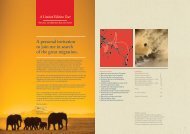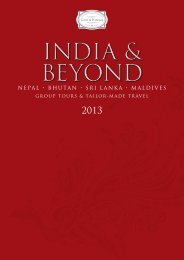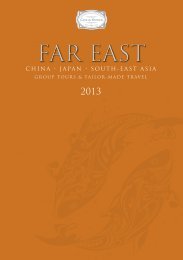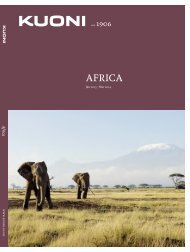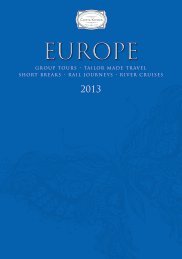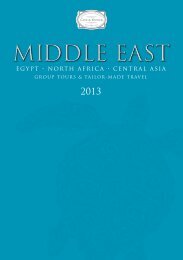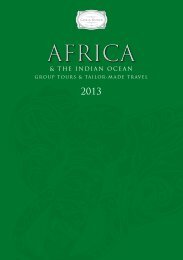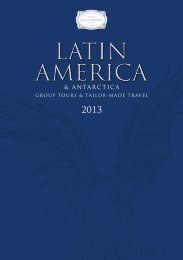YOUR PHRASEBOOK - Travel Club Elite
YOUR PHRASEBOOK - Travel Club Elite
YOUR PHRASEBOOK - Travel Club Elite
You also want an ePaper? Increase the reach of your titles
YUMPU automatically turns print PDFs into web optimized ePapers that Google loves.
getting started<br />
All phrases throughout this booklet are set out in the<br />
following order;<br />
ENGLISH<br />
PINYIN<br />
PHONETIC<br />
Hello or Hi<br />
nĭ hăo<br />
knee how<br />
The first thing to know is the various forms of greeting:<br />
Hello or Hi<br />
nĭ hăo<br />
knee how<br />
How are you?<br />
nĭ hăo ma?<br />
knee how mar<br />
If you are asked the question “How are you?” then the<br />
answer is:<br />
I am very good<br />
wŏ hĕn hăo<br />
war hun how<br />
If you ask the question first and ask “How are you?” the<br />
response will probably be:<br />
I am very good, and you?<br />
wŏ hĕn hăo, nĭ ne?<br />
war hun how, knee ner<br />
To which the final response will be:<br />
I am also very good<br />
yĕ hĕn hăo<br />
yer hun how<br />
So the full conversation will be:<br />
(you)<br />
(them)<br />
(you)<br />
knee how mar?<br />
war hun how, knee ner?<br />
yer hun how<br />
Practice this with your partner or a friend.<br />
Here are the words you have learnt:<br />
You<br />
nĭ<br />
knee<br />
Good; well; fine<br />
hăo<br />
how<br />
add to the end of a word or phrase to pose a question:<br />
PINYIN<br />
PHONETIC<br />
ma<br />
mar<br />
I; me Very<br />
wŏ<br />
hĕn<br />
war<br />
hun<br />
forms an elliptical question:<br />
PINYIN<br />
PHONETIC<br />
Too; also<br />
yĕ<br />
yer<br />
ne<br />
ner<br />
Here are some more greeting words that you can<br />
easily use:<br />
Pleased to meet you<br />
rènshi nĭ hĕn gaoxìng<br />
earn she knee hun gow shing<br />
Good morning<br />
zăoshàng hăo<br />
sow shung how<br />
Goodbye<br />
zàijiàn<br />
sigh shun<br />
Good evening<br />
wănshàng hăo<br />
one shung how<br />
You (formal)<br />
nín<br />
neen<br />
‘nín’ is the polite form of<br />
‘ní’, commonly used to refer<br />
to an elderly or senior<br />
person during a<br />
conversation or to a person<br />
of a similar generation when<br />
speaking on a formal<br />
occasion. It is also a good<br />
form to use just to show<br />
good manners and respect.<br />
28 29






